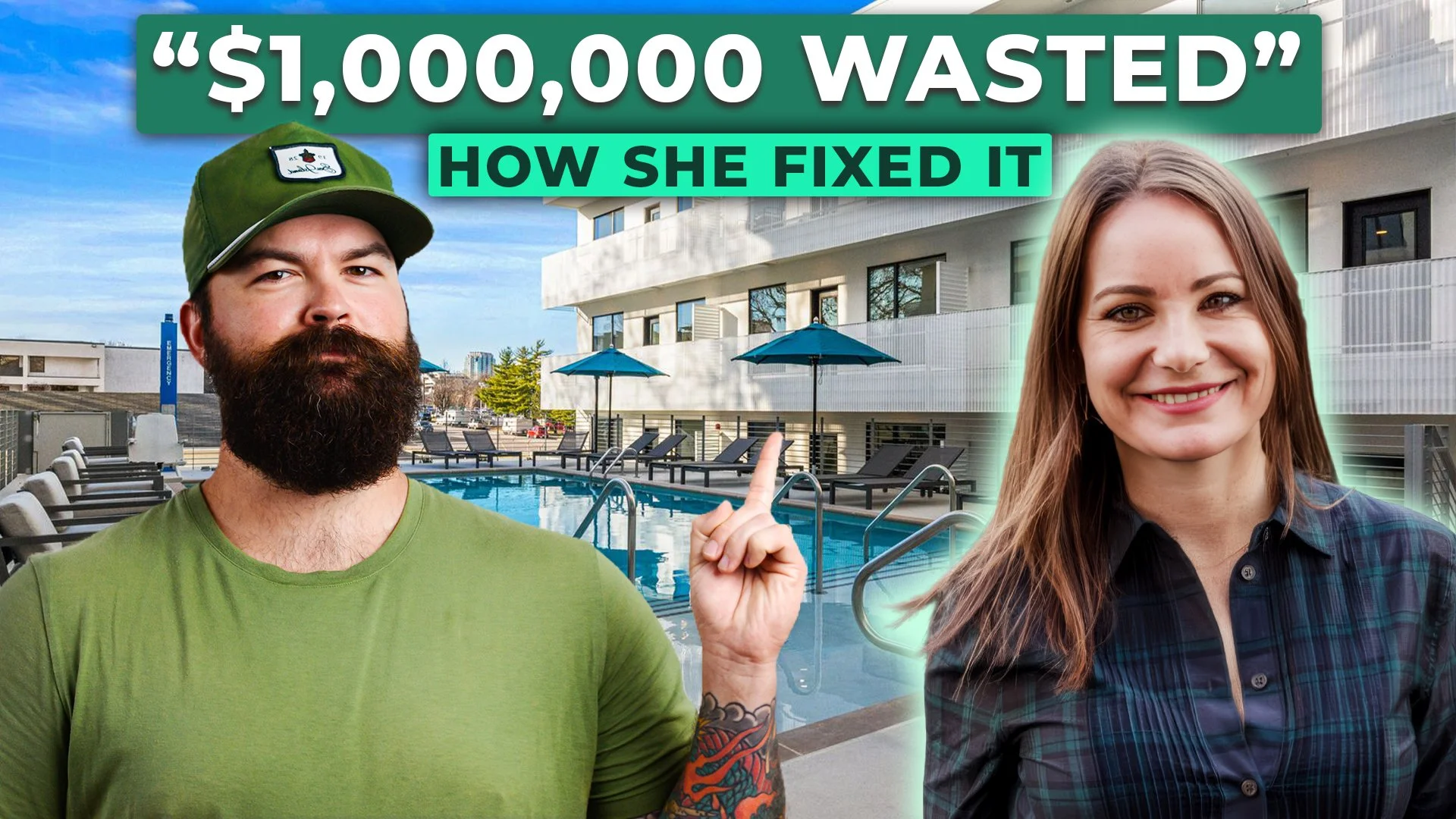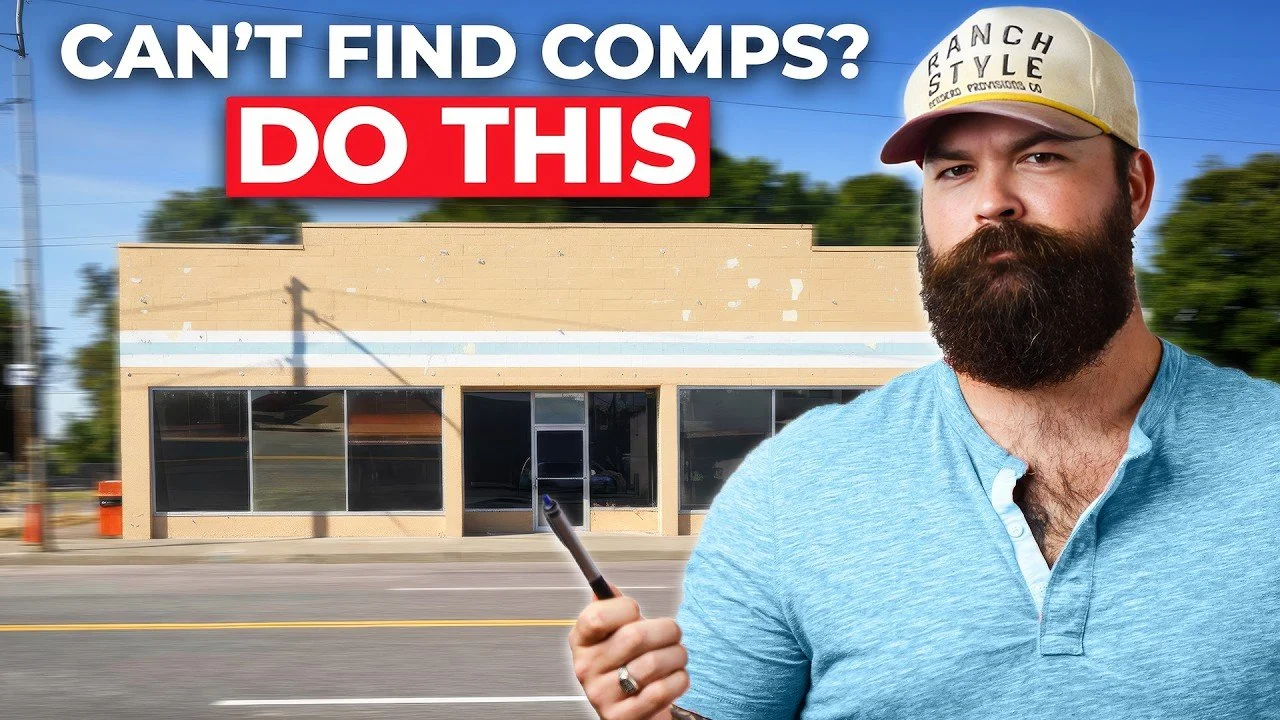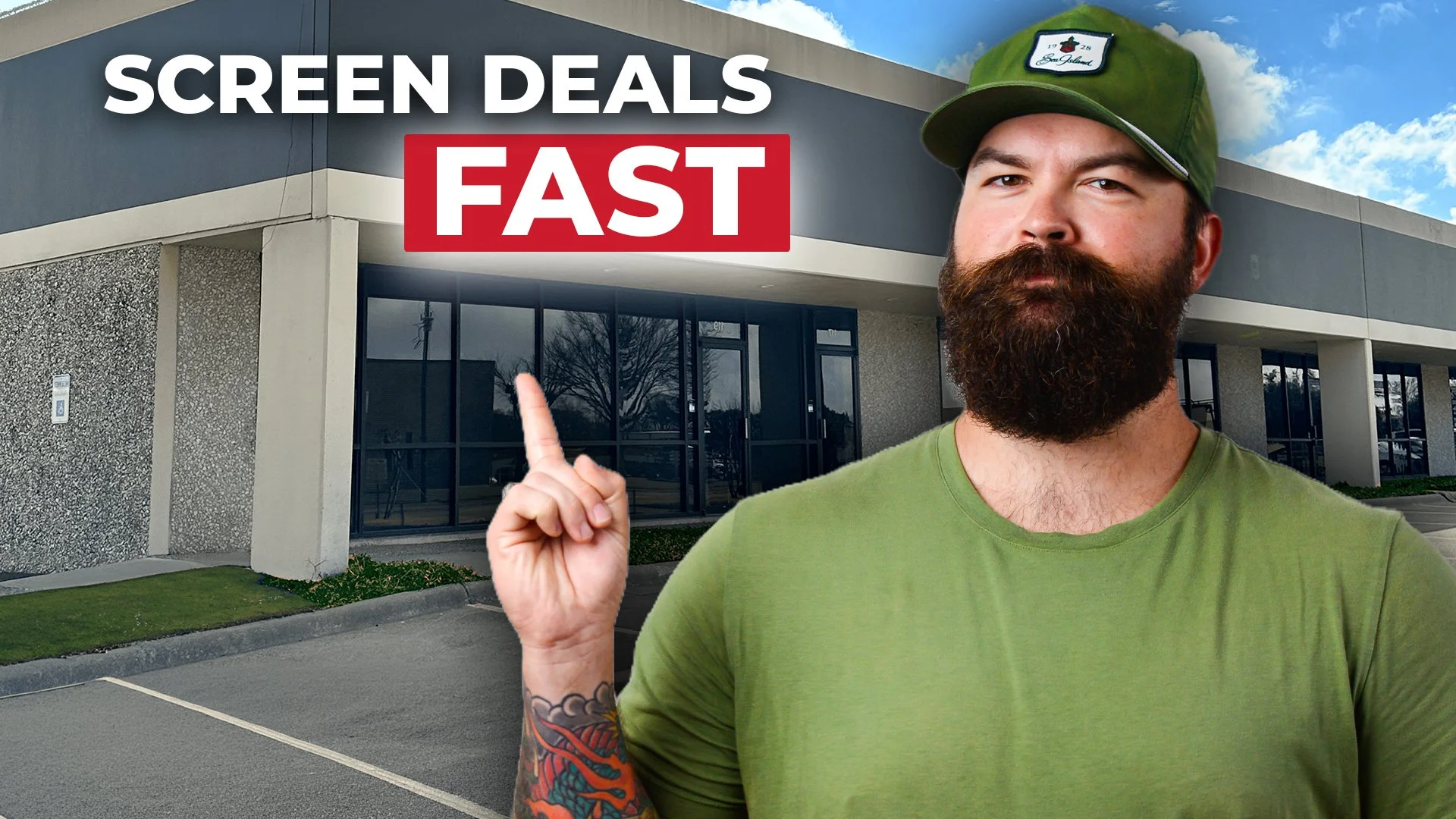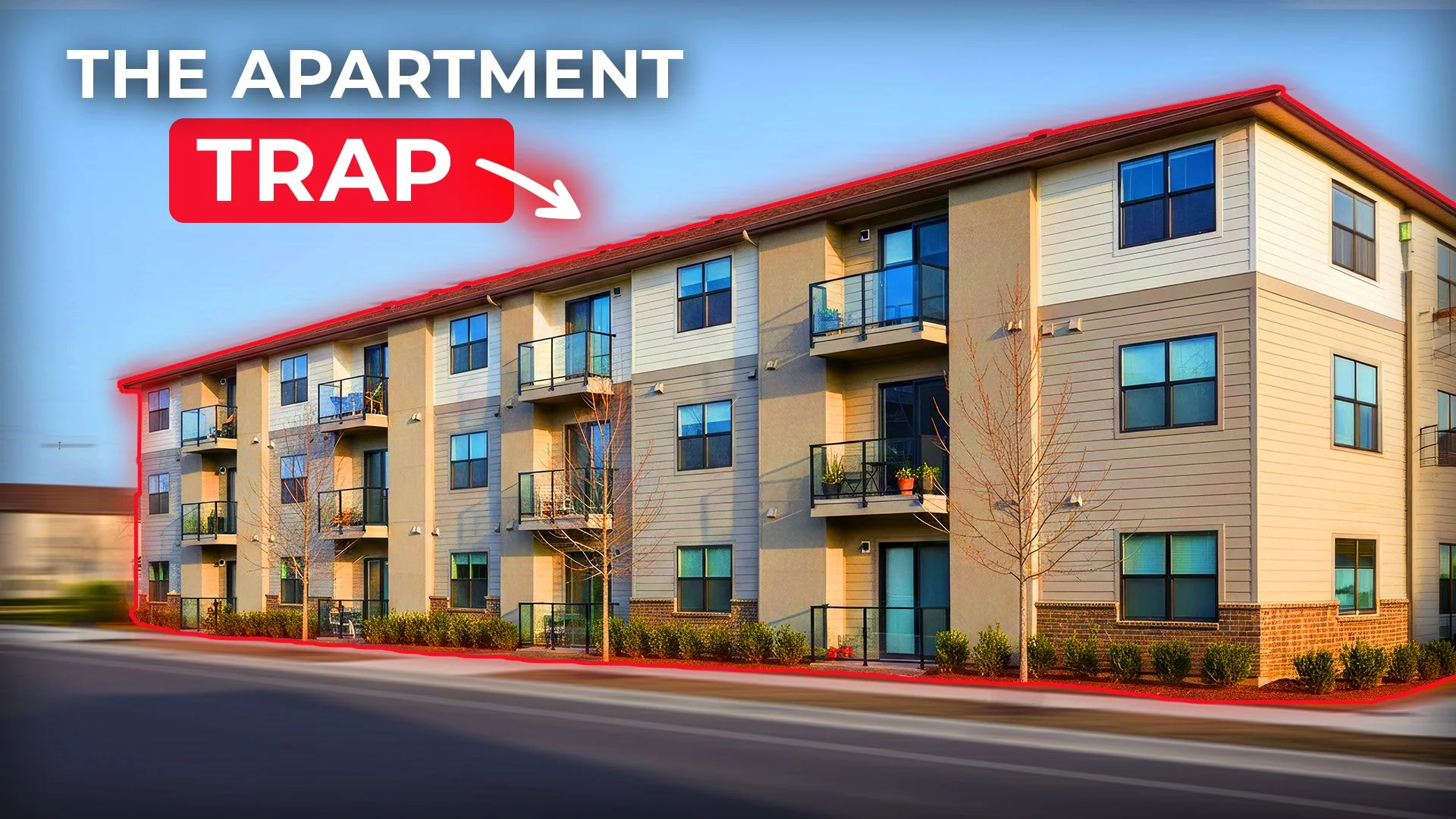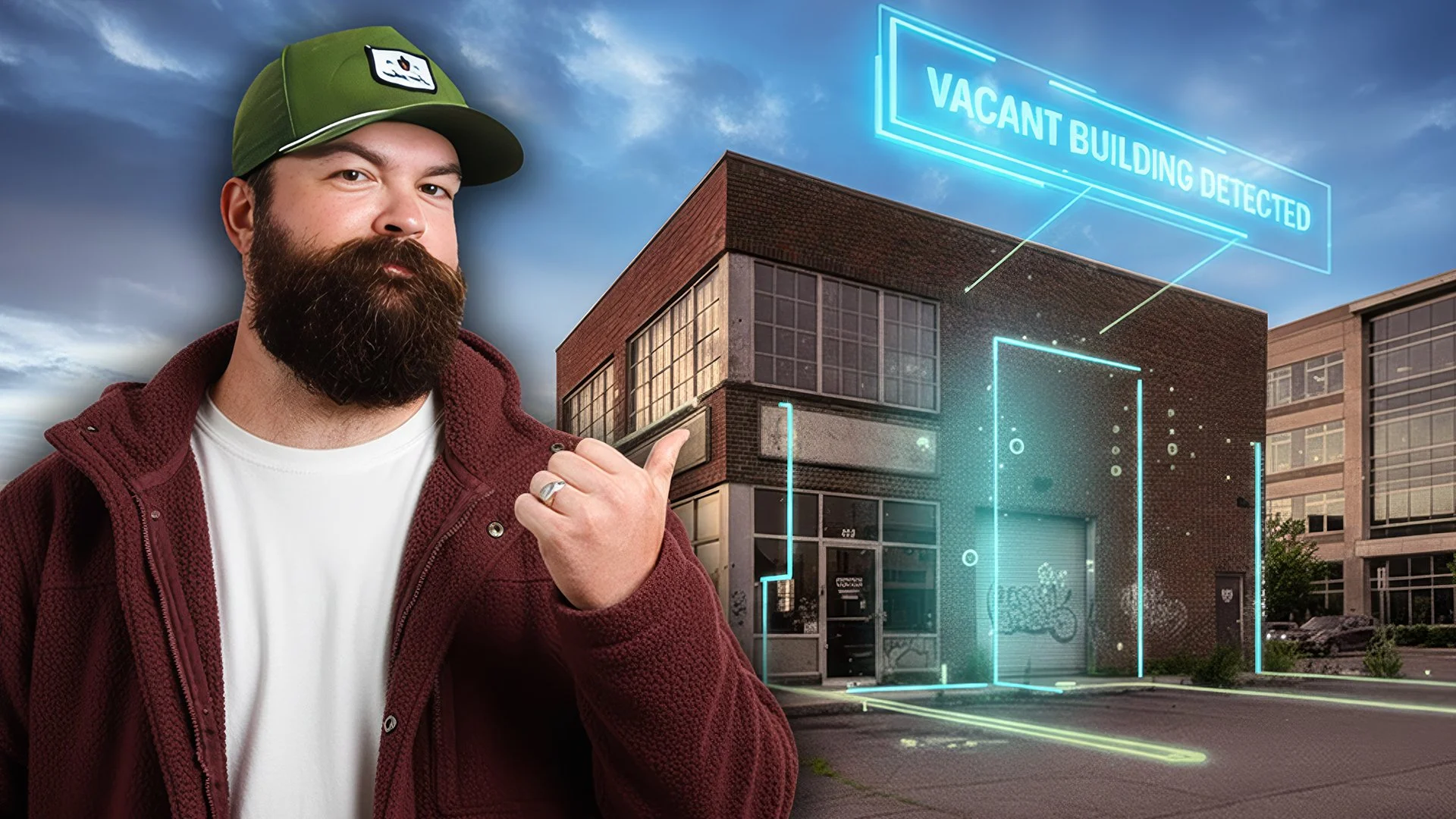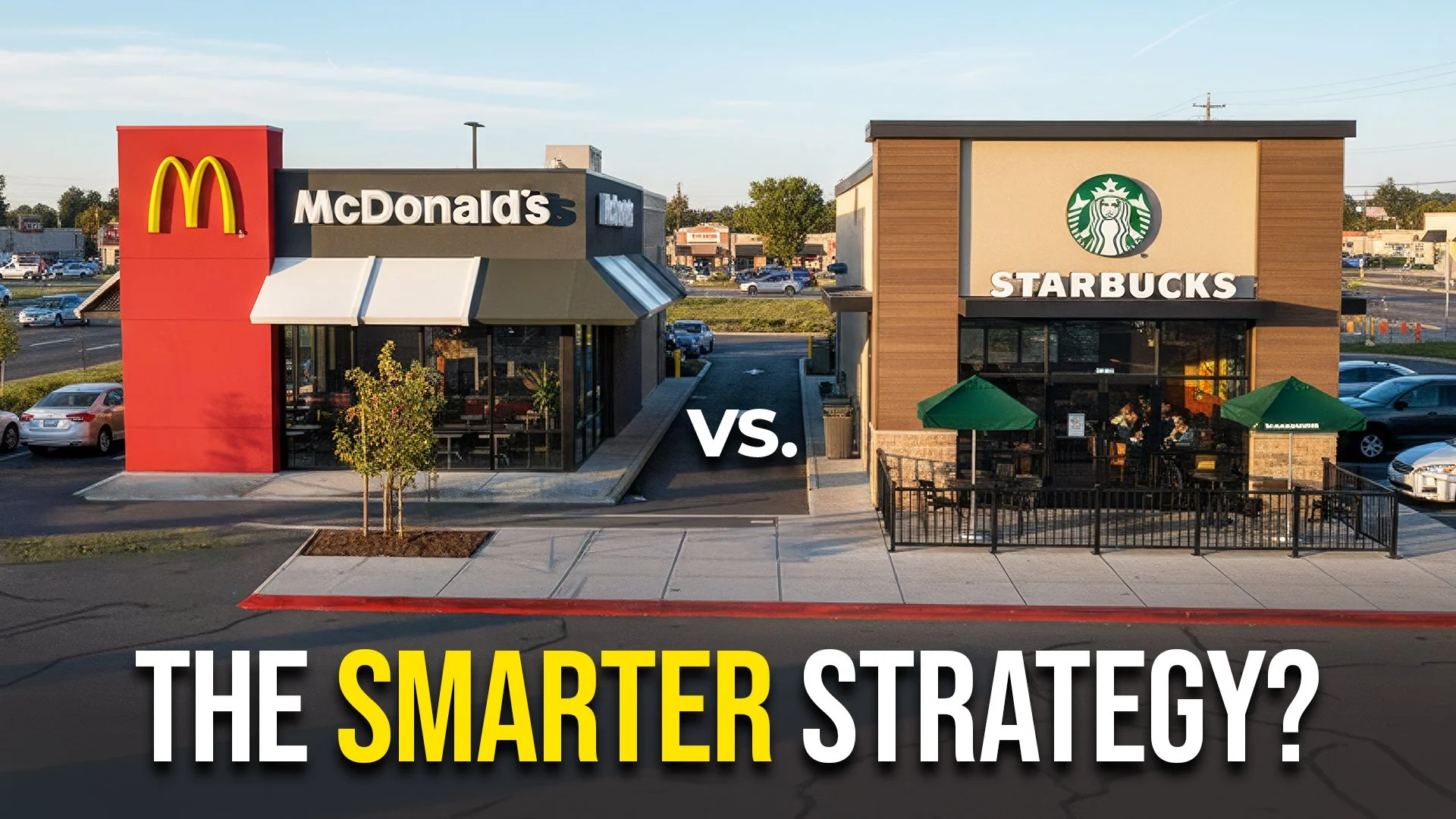Why He Chose Flex Space for His First Development
Alec McElhinny is an industrial owner, operator, and developer based in Texas. He was one of the earliest members of my CRE Accelerator mastermind and today, we're diving into why he decided that developing flex space from the ground up was the right move for him.
Get commercial real estate coaching, courses, and community to jumpstart your investment journey over at CRE Central: www.crecentral.com
Key Takeaways:
Alec transitioned from residential to commercial real estate, focusing on industrial and flex space development.
His first commercial deal was a 54,000 sq ft industrial property in a tertiary market, purchased through creative financing with partners.
Raising capital is often the most challenging part of development, more so than the construction process itself.
Alec chose New Braunfels, Texas for development due to faster site plan approval times and favorable building regulations.
He focuses on building flex space under 12,000 sq ft to avoid expensive sprinkler system requirements.
His current project involves four buildings with a total development cost of around $10 million, targeting rental rates of $16-$20 per square foot.
Key lessons learned include the importance of:
Networking
Understanding market niches
Managing people and relationships
Creative financing
Thorough due diligence
About Your Host:
Tyler Cauble, Founder & President of The Cauble Group, is a commercial real estate broker and investor based in East Nashville. He’s the best selling author of Open for Business: The Insider’s Guide to Leasing Commercial Real Estate and has focused his career on serving commercial real estate investors.
Episode Transcript:
Tyler Cauble 0:00
Steve, this episode of the commercial real estate investor podcast is brought to you by my cre accelerator mastermind, where you'll get access to my step by step investment blueprint, essentially a library of resources on how to invest in commercial real estate. You'll get connected to a supportive community of other commercial real estate investors that are doing projects just like you. You'll get personalized coaching and feedback from me every step of the way. Go to www.crecentral.com to learn more. Welcome back to the commercial real estate investor podcast. We are live today diving into a conversation with Alec McElhenney. And I'm actually really excited for this, because Alec, it was one of the first 10 students to join the mastermind. This is like, gosh, what Alec almost two years ago now. So pretty cool to see you. We were talking right before we went live. He's almost gone full cycle on on a couple of his first flex development projects, and so today we're gonna be diving into his background a little bit, talking about why he chose flex space development and why what his experience has been thus far. And also, spoiler alert, he's moved to Austin, Texas. He's got some new projects going on out in New Braunfels, and we'll talk about those as well. Alec, that was a brief introduction and background on yourself, but tell us a little bit more about how you wound up where you are today.
Speaker 1 1:23
Awesome. Thanks. Tyler, yeah, I was so even actuary in college. And while in college, I was working as a bartending teacher to pay for bills and between classes, like I would just, like, type in my calculator, like, how long it would take to save up this amount of this amount of much money this year saved in the stock market, interest rate X amount of years. And I couldn't find a number that made sense for me to retire on like it all the every time I plug in that those numbers, it take me about 2030, years to be able to retire on it. And I figured the quickest way to shorten that timeline is to increase the rate of return. So I figured, if you if I buy duplex to an FHA loan, I can kind of effectively get like a 30 40% IRR, that was my thinking at the time, and I'll just keep buying duplexes, and I'd be able to get there a little bit quicker. And then I met a guy flipping warehouses. I met a guy building flex developments. I met a guy building RV parks. So I just, I met, like, a lot of people, like Tyler, who are doing, like, pretty cool things. I'm like, Man, I can get there a lot quicker if I just fall in their footsteps and just listen to what they're saying. So yeah,
Tyler Cauble 2:40
well, that's pretty cool. Let's, let's unpack that a little bit more, because I'm curious. I mean, you know, going from duplexes to warehouses, that's a pretty big leap. Where, where did you meet some of these people? Because I would imagine, you know, the networking is always a big piece that people, I feel like, underestimate when they get into this business. You can meet these people out that will show you how to do a lot of this stuff. Where were you meeting people that were flipping warehouses and developing flex space?
Speaker 1 3:04
Yeah, I so I was in the residential world. I was going to a lot of residential meetups and whatnot. And I was listening to bigger pockets. And I started hearing about stories of people being commercial real estate. People flip warehouses or do value add projects. I started going to commercial real estate meetups. There's, if you're going to residential meetups, there's also the same amount of commercial real estate meetups, just many people who want to help you out. And I just, yeah, just kept talking to groups who were flipping warehouses or flipping medical office, just different asset classes. And figured, okay, I'm just gonna pick one, because I gotta, I gotta pick something. And just settled on industrial. So, yeah,
Tyler Cauble 3:46
cool man. Well, so what, what was, what was attractive to you, at first, about industrial versus medical or versus retail, like, what stood out to you?
Speaker 1 3:56
Um, I kind of liked it. Like, I it seemed to be more number based, and like, not about esthetics and how you feel about it. And that's what kind of houses were. To me. It's like, what's the value? Low just depends on how much people want it. And I like, I like it a little bit more concrete. Like, this is what it rents for, and that's a cap rate on it. Boom. That's, that's value of it. I also liked that it seemed like a very stable asset class it I just saw a lot of like, I was up in Minnesota at the time, and I saw a lot of like, vacant retail, especially after like, COVID and George Floyd and all that. I just saw a lot of vacant retail in a lot of areas, areas that used to be like, very, like, very valuable areas. And I, I just didn't understand how I could invest in something and lose a lot of value. So I wanted to go into industrial
Tyler Cauble 4:46
cool. So talk to us about your first commercial deal. I mean, what? What did that look like? Was it? Was it an industrial flip? Was it straight into development? What'd you
Speaker 1 4:57
do? Yeah, um, I found a group. Of guys who were buying their first, I think they're on their second or third. Like industrial purchase. We partnered together. We bought a I think it's like two buildings. It's adds up to be around 54,000 feet in outdoor storage lot. It was mostly vacant. It was like in a tertiary market, where it's pretty hard to lease up, so it was just a lot of people didn't want to touch it. And that's something a big thing in real estate is find the things that people don't really know, what like like, find the niches, find what people aren't willing to touch, or what people don't really know a lot about. And then there's a lot of there's a lot of opportunity there, like in in houses or residential there's so much information out there. It's, it's almost become a science that you need to buy the CRM to do this, talk to these wholesalers, and then you'll make this, you know, small profit for that. In commercial real estate, there's a lot of unknowns and a lot of niches that are yet to be explored, and a lot of ways to, you know, make a good living. So, yeah.
Tyler Cauble 6:02
Well, cool. Well, tell us more about that deal. I mean, how did you find it, how did you fund it, and what did it end up looking like?
Speaker 1 6:08
Yeah, it was on loop net for a while. I think somebody had it under contract, and it fell out under contract. It was list on loop net for around two point I want to say, 2.22 point formula, and something like that. It was up in St Cloud or a little outside of St Cloud. And if anybody knows where St Cloud is, up in Minnesota, it's about an hour, two hours north of Minnesota. It's not a very it's not a it's not a primary market by any means. It's more of a like tertiary market. And if you want, like, a cheap spot to lease, like, that's the place where you have your company at. So, yeah, we found it had a lot of issues with it, a lot of vacancies. It had a two acre lot that wasn't paved, wasn't filled yet. So yeah, there's a lot of value to put into it. The owner was, this was like his smallest property in his entire portfolio, and he, I think he owned like 20 other big properties, and he just wanted to get rid of this thing. This thing was just like a thorn inside. So we were able to get it for a good price and get a seller carry on it too, which helped with the down payment on the bank loan. So, yeah, that's
Tyler Cauble 7:21
pretty great. I mean, that's nice to must be a pretty nice portfolio to say that a 2.4 to $2.5 million property is the smallest, smallest property in your portfolio. So how did the capital stack shake out? I mean, so it sounds like you had a traditional bank loan. You've got seller carry, you know, how much equity Did you guys have to bring down? How are you raising the capital? What did that look like?
Speaker 1 7:45
Yeah, I put my own money in the deal. All the partners just put their own mind deal, and we split it four ways. It was four guys. And I want to say it was like 200k of equity that we brought the bank loan we got was around. 75 loan to value. And then the bank also gave us a development loan of around 200k to like at a like at a demising wall, fix up the property and all that. And then the seller carry. I want to say it was around two 300k I don't have the note in front of me, but it was somewhere around there and a seller. When I say seller carry it's just like a when you buy. This is something creative you can do in commercial real estate that's a little bit harder. In residential, you can get a bank loan and then the seller can offer a second position note that helps with the down payment. So let's say you're gonna go 25% down with with the bank, the seller, the seller can come in and say, hey, I'll cover, I'll cover around half of that. I'll cover around the 12 and a half percent of your down payment. So now you only have to go 12 and a half percent down.
Tyler Cauble 8:54
Yeah, I love that. Getting creative on these deals is the way to make it work. You know, a lot of people get intimidated by hearing, oh, I've got to bring 12 and a half or sorry, 25% down on two and a half million dollars. But once you start breaking it down and you figure out, okay, well, I can get creative, negotiate with the seller to do a seller carry back for 12 and a half percent of my 25% grab three buddies. We all go in on this together. It's actually far more approachable. What'd you guys end up doing with that
Speaker 1 9:21
deal? We still own it. I I don't know when we're gonna sell her. There's other partners on it, so it's honestly what everybody wants to do. And yeah,
Tyler Cauble 9:31
yeah, it
Speaker 1 9:35
was. We have some vacancies now, so we're there was a little bit of a slowdown in that market for larger like the larger Bay stuff. I don't know if you've know, I don't know if this happened in Nashville, but I've noticed this, like in all the cities I've been to in the last years, like a lot of these funds built these larger Bay like concrete tilt up where. Houses, and that product was kind of over built. I'm guessing it was probably overbuilt a little bit in Minneapolis, and that's affecting our building a little bit, but our building still more valuable than what we bought it for, and once we get that lease out, it'll be awesome. So no
Tyler Cauble 10:14
100% I mean, what we what we've seen, is, you know, the the industrial, very similar to multifamily just got heavily overbuilt. Mean, it was, it was the, you know, the hottest girl at the dance for the longest time.
Speaker 1 10:27
What happened? Like, what happened there? Like, what mindset conference did people go to to be like, we're all going to do industrial now, we're all going to
Tyler Cauble 10:34
be great question. I mean, here's the thing, it was just the fact that E commerce was crushing it so much in logistics. So you have, you know, the rise of E commerce, one with the rise of same day next day shipping, right? So not only are more businesses, I mean, it's a great question, Alec, not only are more businesses moving online, so you're not necessarily having stuff in stores, but they're also having to be able to deliver it to you same day, next day, which means they just have to have warehouses everywhere. Instead of having, you know, one massive location, you know, out in the middle of Kansas, they've got to have 100 locations across the country. So it just totally changes it. But I mean, because of that, you do have a fair amount of vacant, brand new spaces that are dropping in price and attracting tenants like yours, but that gives you an opportunity to go ahead and take that split it up in a smaller base, rent it out for a higher price per square foot, and, you know, increase the value of your property, you know. So always something good there. Okay, let's talk about the first deal that you and I started working on, which we were talking about right before we went live, you're about to go full cycle on it. I mean, it's you said it's going to be done here in about like two to four months. And, I mean, man, yeah, construction is construction. I've been
Speaker 1 11:57
saying that for a long time. So we bought the land, entitled to Ed site plans. It only took a month to get the land disturbance permit so we can, like, start, like, starting to site work on it. The issue is we kept having investors back out. We had an investor who said they're going to do the deal for about six months, and we just kept waiting for them, and then they backed out. And then we found another investor. They backed out. And it was, it was just a process of, when could we get an investor to actually do this deal? Yeah, and it was, it was, it was such a small deal, like, it's, I've found this to be interesting, like, the bigger deals seem to be easier to raise for, which doesn't make sense to me, but that's how it works. So it was a really small, like, the construction budget was around a million dollars. So that's kind of hard to find.
Tyler Cauble 12:48
So, so you're aiming to raise just a million,
Speaker 1 12:52
yeah, oh yeah, raise a million. And I have a, I have a note on the land, like a turn. The broker that we went with. We got the land for pretty good deal. I think, I think the land was probably worth like 450 at the time, and we got it for 275 so the broker was like, Oh yeah, for sure. Give you a first position note on that, because they have plenty of equity in it, and they'll get the land if we, you know, ever default. So yeah, we'd love to be in that first position. So, yeah,
Tyler Cauble 13:24
so did you guys ended up raising the capital?
Speaker 1 13:27
Yeah, we raised the capital all the site works on concretes being poured. I hope that it's finished by the end of the summer. But, you know, it's development. There's, there's always risk for it. And honestly, the biggest risk for this project was like, when can we get the money to build it? Like, the actual building part was a lot easier. So,
Tyler Cauble 13:49
yeah, I mean, that's that's always the biggest unknown for me too. It's like, man, the capital stack is always the most difficult part. It's like, yeah. I mean the construction part in making selections. I mean, that's exhausting just because it goes on and on and on. But at least once that train is rolling like it's it's rolling like it you know, you've got an architect to help you, you've got an engineer to help you. When you're raising capital, it's kind of just you, yeah, it keeps going,
Speaker 1 14:15
Yeah. And that's, that's the and that's the thing right now, with the deals that I'm raising out for in Austin. It's like these deals make 100 these deals make 100% sense. They're in really easy counties to work with to get approved, easy counties to build in the issues like finding the money right now, like the equities, in my opinion, like half half my time. I'd rather be developing full time being an operator, but right now, it's a little bit hard to find equity for
Tyler Cauble 14:46
me. Welcome to my world. I say that all the time, like, Man, I spend way too much time having to raise capital. I'd much rather just be developing full time and not having to talk to investors. But here
Speaker 1 14:56
we are some people who like they've. Full Time. They like capital, and if you can partner with them and like, obviously, like their their partner with you, and they're taking on roles in the company and whatnot, and helping a little bit of development process, like, that's a great partnership. If you find somebody, and they're they're good at something, and you're not good at it. Like, partner with that person. You don't want to partner with people who are good at what you do, because it just doesn't help you out. Yeah,
Tyler Cauble 15:25
I completely agree. I mean, it's, it's, you know, I say this all the time, no man is an island, and commercial real estate, especially development, is a team sport. You should not be doing this on your own. Go find people that complement your skill set and tackle this together. What have been some of the biggest surprises or biggest takeaways or learning lessons from going through this first development
Speaker 1 15:51
project, it's honestly been like managing people, like understanding how people work, and that's partners, contractors, everything, everybody has, you know, emotions, egos, everything. And, I mean, like I do too, and it's, it's learning how to deal with people. And that's people saying, I've heard people say this, like, commercial real estate, it's all about, it's like a people business. And I, I fully believe that, like when I first got into him, like, it's just numbers, but no, it's a lot of learning how to work with people and be a leader and listen to people. So
Tyler Cauble 16:29
especially in construction, having to deal with a GC and deal with subs and yeah, it's always fun, no matter how good they are.
Unknown Speaker 16:39
Yup. So yeah. Well, cool,
Tyler Cauble 16:41
man. Well, so that one's finishing up here soon. I know you've got another project under construction, or under contract, rather, in New Braunfels. I mean, Tell us. Tell us about how, how are you, you know, pulling all this together. I mean, what? What made you decide, You know what? I don't necessarily want to do the flips. I want to go all in on the development. And I'm going to start tackling New Braunfels, Texas.
Speaker 1 17:03
Um, yeah, it was, I think you can make, you can make money doing anything, if you just get really good, like you can, you can flip houses and get really good at it, and probably make really good money. You can be a house developer. Make really good money. You can develop skyscrapers. You just got to pick something. I picked. I picked a flex retail product to build because it makes sense to me. I know, I know how to do it, and I like the finished product. I like how it looks. It looks kind of cool, so I it's just, it's just something I picked. And that's kind of a boring answer, but got to pick something I picked. I picked New Braunfels because it's so it's a little bit of it's a little outside of the city of New Braunfels. New Braunfels can take a full year and a half to get site plan approved. And anybody that is not familiar with what site plan approved means when you buy raw land and you want to build something on it, that's great. You got to hire engineers, architects, MEP, you got to get that approved by the city or county that you're in, and that can take a long time. And the the county that I'm building in, como county right north of New Braunfels, it only takes about four months to get approved. And that's, that's a really big difference. That's a really big difference buying raw land and waiting, like, a year and a half to two years. So I'd rather focus on product projects that I know I can build pretty quickly and I don't have to worry about the risk of the city shutting it down.
Tyler Cauble 18:39
Yeah, what size of what size of what size of buildings are you typically going
Speaker 1 18:44
for? So in Como County, they follow the national fire code. I think it's called, like a type to be building, and that basically that means, like, what type of material to be out of, and what type of what type of size it needs to be, did not have a sprinkler limit. So if it's under 12,000 square feet in Como County, you don't have to put a sprinkler system in, which saves a lot of money and tap these and all that. If I were building in a different municipality like Hutto, where the other deal is, I think I want to say that size around 10,000 feet. So I'd have to build under 10,000 feet, not the sprinkler system. Yeah,
Tyler Cauble 19:26
that's typically what we see most of our students doing is under 10,000 because once you hit that sprinkler it's $150,000 right off the bat, like man, in order to justify that, I mean, that's like 15% of your build cost, right there. We've got a question from Bob Smith, yeah, it's crazy. Bob is saying local bank will not give you a loan. Why not? Aren't there specific brokers at national banks that would loan you money too? Bankers love making money. Why would financing be an issue? Bob, I don't think that Alec was saying anything about financing being an issue. We were talking about raising equity. I. Unless I miss something. Alec, did you say anything about financing being
Speaker 1 20:04
an issue? I didn't, but that's actually a great point. If you're building so you can, you can build a project with a tenant already ready to go, and that's a very different conversation than like building flex space. Flex space you're building at spec. And banks don't like that. They don't like the word like speculatively building, even though it's a product that's highly needed. So a lot of a lot of my effort right now is just making sure I get this thing pre lease so I can get, I can get a bank loan, which is pretty doable for the site, but some people are having issues getting bank financing for speculative projects right now.
Tyler Cauble 20:39
Yeah, yeah. Yeah. On speculative projects, you know, banks are going to be looking very specifically at your balance sheet. So if you have enough assets, enough global cash flow, enough cash on hand, and the equity, then they're not going to care if you're going speculative. But if you don't have the balance sheet to really back it up, or if you don't necessarily have the experience that a bank is going bank is going to say, we're just not going to touch it. But a lot of banks out there, especially in a market like this, they're going to say, hey, we want to see some pre leasing activity, right? We need to know that you're going to be able to have some interest in this building no matter what. And so that's, that's what Alec is experiencing right now, is, you know, hey, we would like to know that there are people out there interested. And that's not uncommon. When you're doing ground up development, a lot of banks like to see some sort of pre leasing activity going on.
Speaker 1 21:30
Yep. So in my my bank, oh, sorry, you go, no, no, go ahead with flex space. It's kind of funny. You only need an LOI to show that it's pre lease. So it's not very hard to get an LOI. It's not very hard to show somebody, Hey, do you want this? Do you want to put an LOI on a site? So that's, that's a little trick there. Yeah. I mean, don't actually need a lease right before you can just have an
Tyler Cauble 21:55
LOI. Yeah. You don't have to go all the way. So, okay, 30,000 foot view. What? What are your expenses look like? How much you buying land for? What are the construction costs? And what are you running these things out for?
Speaker 1 22:07
Yeah, so I, I originally had the site under contract for 2.9 5 million, I believe, I asked the seller for all the documents I read through, I think, 300 pages of title commitment, and two months within due diligence. I was talking to the neighbors, Lennar homes, they build homes, and they briefly mentioned a tenant restriction. Like tenant restriction, there's no tenant restriction. There's nothing that came up in the deed and the title commitment. There's nothing that came up with the seller disclosure. He's like, there's a tenant restriction, and he sent it to me, and that's, that's a that's another risk that comes up with development. You can do all your homework, and there's still things that the seller sometimes doesn't share, and that you got to find that it's your job to find that. So I found that, I found that there was a 30 foot setback when prior there wasn't any setback. So that kind of changed the layout of the site, and I was able to renegotiate a better price for the land. So I'm I got under contract, I think, for around 2.7 what are
Tyler Cauble 23:16
you what are you building them for, and what are you running them out
Speaker 1 23:20
for? Yeah, so I'm doing phase one, and that's just four buildings, and all the site work together. It's nicer to do all the site work together, to lay all the pipes and all that. That total cost will be around $10 million all in for phase one, and that's including purchasing the land, doing all the site work, paying for the soft cost, which is like engineering fees and impact fees, and that's putting up for buildings as well.
Tyler Cauble 23:44
Yeah. There you go. Yeah. So lands about 20% of your cost, which is basically where you want to be. And then Rhett, 16 bucks a foot, triple net, is that kind of what you guys were aiming for. I
Speaker 1 23:55
will, man, I'm feeling pretty good about this area, because it's on 35 frontage, and you can see the site from about like a mile and a half away. So it's going to be, I'm calling it flex space, but it's really more like a flex retail product, because as so many cars going by, I think it's like 150,000 cars going by. I think it's going to get 18 to 20 bucks a foot, and then the back ones will probably get closer to 16 to 18 bucks a foot. Yeah,
Tyler Cauble 24:21
that's great, man. Well, Alec, thanks so much for coming on the show and sharing your journey. Man, if anybody wants to follow along and kind of see the projects that you're doing, where can they find you?
Speaker 1 24:32
Yeah, lampplay.com, is a great spot. That's a great spot to find me. I am starting a YouTube channel pretty soon, just to kind of help people get into developing and land entitlement. And also, there's a there's a lot of like, amazing, like affordable, like, like building materials that you can buy, like, in Vietnam, Ukraine. Between Eastern Europe, like the eastern Asia, South Asia. And I want to try to bring that in for people who want to build on a budget, like really nice things, I think it's really doable to build, like, with beautiful architecture on a budget. Yeah,
Tyler Cauble 25:16
that's awesome. All right. Landplay.com. Alec, thank you so much for coming out today, man. Thank you guys for tuning in. If you're joining us on Apple podcast or Spotify, please leave us a review that always helps get the podcast out to more people. If you are watching on YouTube, give us a like. Give us a thumbs up. Leave us a comment. Let us know what you think about developing flex space. We'll see you guys in the next one.
Unknown Speaker 25:42
You episode of
Tyler Cauble 25:44
the commercial real estate investor podcast is brought to you by my cre accelerator mastermind, where you'll get access to my step by step investment blueprint, essentially a library of resources on how to invest in commercial real estate. You'll get connected to a supportive community of other commercial real estate investors that are doing projects just like you. You'll get personalized coaching and feedback from me every step of the way. Go to www.crecentral.com to learn more you.


